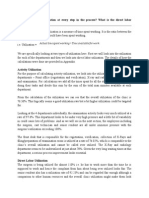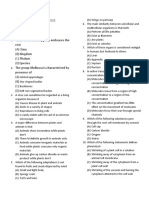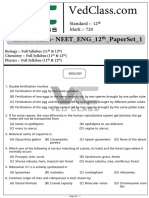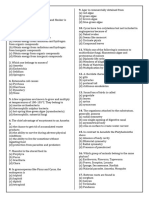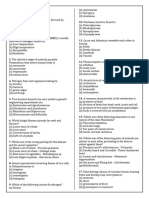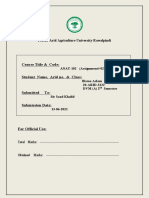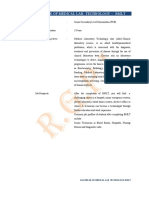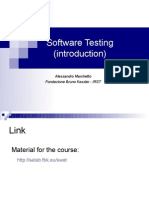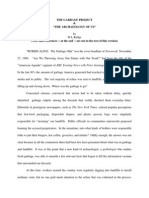0 ratings0% found this document useful (0 votes)
19 viewsSS 2 Biology
SS 2 Biology
Uploaded by
Akachinedum Nwaogu1. The document is a biology exam with questions testing knowledge of cells, organisms, ecosystems, and related topics.
2. It includes 30 multiple choice questions covering topics like cell structures and their functions, classification of organisms, food webs, and ecological relationships.
3. The questions refer to diagrams of organisms, cells, and pyramids of numbers to test the interpretation of visual representations related to biology concepts.
Copyright:
© All Rights Reserved
Available Formats
Download as DOCX, PDF, TXT or read online from Scribd
SS 2 Biology
SS 2 Biology
Uploaded by
Akachinedum Nwaogu0 ratings0% found this document useful (0 votes)
19 views6 pages1. The document is a biology exam with questions testing knowledge of cells, organisms, ecosystems, and related topics.
2. It includes 30 multiple choice questions covering topics like cell structures and their functions, classification of organisms, food webs, and ecological relationships.
3. The questions refer to diagrams of organisms, cells, and pyramids of numbers to test the interpretation of visual representations related to biology concepts.
Original Title
SS 2 BIOLOGY
Copyright
© © All Rights Reserved
Available Formats
DOCX, PDF, TXT or read online from Scribd
Share this document
Did you find this document useful?
Is this content inappropriate?
1. The document is a biology exam with questions testing knowledge of cells, organisms, ecosystems, and related topics.
2. It includes 30 multiple choice questions covering topics like cell structures and their functions, classification of organisms, food webs, and ecological relationships.
3. The questions refer to diagrams of organisms, cells, and pyramids of numbers to test the interpretation of visual representations related to biology concepts.
Copyright:
© All Rights Reserved
Available Formats
Download as DOCX, PDF, TXT or read online from Scribd
Download as docx, pdf, or txt
0 ratings0% found this document useful (0 votes)
19 views6 pagesSS 2 Biology
SS 2 Biology
Uploaded by
Akachinedum Nwaogu1. The document is a biology exam with questions testing knowledge of cells, organisms, ecosystems, and related topics.
2. It includes 30 multiple choice questions covering topics like cell structures and their functions, classification of organisms, food webs, and ecological relationships.
3. The questions refer to diagrams of organisms, cells, and pyramids of numbers to test the interpretation of visual representations related to biology concepts.
Copyright:
© All Rights Reserved
Available Formats
Download as DOCX, PDF, TXT or read online from Scribd
Download as docx, pdf, or txt
You are on page 1of 6
SS 2 BIOLOGY 5.
In which of the following is the cell NOT
capable of independent existence
1ST TERM EXAMS. SECTION ONE OBJ.
(A) Paramecium
ANSWER ALL QUESTIONS (B) Euglena
(C) Spirogyra
1. Which of the following statements best (D) Amoeba
describes species 6. The structure responsible for
(A) The naming, describing and reproduction in the cell is
classifying of organisms (A) Nucleus
(B) Organisms of the same genus with (B) Mitochondrion
different characters (C) Endoplasmic reticulum
(C) A group of organisms that (D) Lysosome
interbreed to produce viable off 7. Which of the following statements best
springs defines plasmolysis
(D) Organisms within the same family (A) Shrinking of the cytoplasm away
that share the same characteristics from the cell wall due to water loss
(B) Movement of water from a region
of higher concentration to a region
of lower concentration
(C) Shrinking of an animal cell when
placed in a hypotonic solution
(D) Absorption of water by cells leading
to turgidity
8. When the tip of a shoot is removed in
an experiment on phototropism, the
shoot
(A) Stops growing
2. The organism in the diagram belong to (B) Maintains straight growth
class (C) Bends downwards
(A) Insect (D) Bends away from light
(B) Arachnida 9. The main importance of excretion to a
(C) Chilopoda living organism is that it
(D) Crustacean (A) Gets rid of toxic waste
3. In which of the following habitat can (B) Reduces constipation in the cell
the organism be found (C) Remove all the water from the cell
(A) Marine (D) Builds up the body of the cell
(B) Forest 10. The layer of cell which is specially
(C) Swamp designed to absorb sunlight in the
(D) Pond leaves is
4. The structure that confirms the habitat (A) Upper epidermis
of the organism is (B) Lower epidermis
(A) Antenna (C) Guard cells
(B) Compound eye (D) Palisade mesophyll
(C) Abdomen
(D) Uropod
11. Which of the following food items
produces the greatest amount of 15. The diagram also represents
energy for the farmer (A) Pyramid of biomass
(A) Beans (B) Histogram
(B) Vegetables (C) Food chain
(C) Cabbage (D) Food web
(D) Yam 16. Which group of organisms are likely to
12. Rivers, lakes, oceans, are part of the be found in the part labeled III
(A) Biosphere (A) Producers
(B) Lithosphere (B) Carnivores
(C) Hydrosphere (C) Primary consumers
(D) Atmosphere (D) Secondary consumers
13. Which of the following populations is 17. In which of the labeled parts in the
most likely to go into extinction diagram will herbivores be found
(A) A small population in a very (A) I
unstable environment (B) II
(B) Large population with high survival (C) III
value (D) IV
(C) Small population with adequate
resources In a population of rats, the statistics
(D) Large population with little show 86 births and 36 deaths, per
predation 1000. Use this statement to answer
14. Interaction between living and non-livi the questions 18 and 19.
ng components of the environment is 18. What is the birth rate of the rats
called (A) 8.6%
(A) A community (B) 10.9%
(B) An ecosystem (C) 34.0%
(C) A biotic factor (D) 86.0%
(D) An abiotic factor 19. Wild life is conserved in
(A) Game reserves
The diagram below is a representation (B) Forest reserves
of a pyramid of numbers. Use it to (C) Amusement parks
answer the following questions (D) Natural parks
20. Which of the following statements is
true of all living cells
(A) They are surrounded by cell walls
(B) They are the basic unit of life
(C) About 30% of the cell is made up of
water
(D) They have chloroplast for the
production of food
21. A virus is not regarded as a cell because 26. The part labeled I is the
(A) It has no nucleus or cytoplasm (A) Nucleus
(B) Has no nuclear material (B) Vacuole
(C) It has no cell membrane (C) Ribosome
(D) Cannot be seen under the light (D) chloroplast
microscope 27. which of the following reagents is used
22. Which of the following organisms are for testing the presence of reducing
called eukaryotic sugars
(A) Protozoa (A) benedict and Felling’s solution
(B) Bacteria (B) benedict and Sudan III solution
(C) Viruses (C) iodine and Felling’s solution
(D) Blue green algae (D) millon and Biuret solution
23. Which structure in the plant cell 28. The functionsl role of an organism in a
contains cell sap community is termed
(A) Cell wall (A) Ecological system
(B) Cell vacuole (B) Food web
(C) Chloroplast (C) Ecological niche
(D) Nucleus (D) Food chain
29. The base of a pyramid of numbers may
be narrow because the
(A) Producers are numerous
(B) Primary consumers are ruminants
(C) Producers comprise mainly of trees
(D) Carnivores occupy the second
trophic level
24. The part labeled II is a
(A) Kidney
(B) Bean seed
(C) Stomatal pore
(D) Cell
25. The function of the part labeled II is for
(A) Transport of mineral salts
30. Which of the following statement about
(B) Emergence of the radicle
the organism in the diagram below is
(C) Transport of manufactured food
not correct
(D) Gaseous exchange
(A) It is destructive to farmers
(B) The larvae are called caterpillars
(C) Has aesthetic value
(D) It is the adult in the developmental
stage
31. The organism belongs to phylum 39. Mammals that lay eggs are called
(A) Arachnida (A) Monotrems
(B) Insect (B) Marsupials
(C) Arthropoda (C) Rodents
(D) Criustacea (D) Primates
32. The relationship of the organism with 40. A fresh kolanut weighing 10gms was
plants in the ecosystem is put into a salt solution and after
(A) Parasitic 3hrsthe kolanut weighed 12 gms. This
(B) Mutualism simple experiment demonstrates that
(C) Saprophytic the
(D) Commensalism (A) Cell sap of the kolanut is more
33. Which of the following organisms feed concentrated than the solution
on dead organic matter (B) The solution is more concentrated
(A) Lichens than the cell sap of the kola nut
(B) Rhizopus (C) Kola nut lost some water to the salt
(C) Mistle toe solution
(D) Spirogyra (D) The solution has the same
34. Which of the following organisms concentration as the cell sap of the
exhibits adaptive coloration kola nut
(A) Rabbit 41. The census method of population
(B) Chameleon sampling is NOT suitable for which of
(C) Mouse the following organisms
(D) Dog (A) Butterflies
35. The feeding habit of amoeba is (B) Mango tree
(A) Parasitic (C) Cats
(B) Endocytic (D) Chicken
(C) Pinocytic 42. Which of these organisms may likely
(D) Phagocytic show a random distribution in their
36. Which of the following plant hormones habitat
can be used to make plants tall (A) Baboons
(A) Ethylene (B) Earthworms
(B) Gibberellin (C) Termites
(C) Cytokinin (D) Blue jays
(D) Abscisic acid 43. Which of these cells of the hydra helps
37. Star fishes belong to the phylum in the sumersaulting movement of the
(A) Pisces animal
(B) Osteichthyes (A) Glandular cell
(C) Echinodermata (B) Musculo epithelial cell
(D) Mollusca (C) Flagellated cell
38. Octopuses belong to the phylym (D) Phagocytic cell
(A) Pisces
(B) Osteichthyes
(C) Echinodermata
(D) Mollusca
44. Which of these cells helps in
maintaining the freshness of the
enteron in the hydra
(A) Flagellated cell
(B) Glandular cell
(C) Musculoo epitelial cell
(D) Phagocytic cell
45. Which of these organelles has the
capacity of breaking down substances
in the cell
(A) Lysosome
(B) Ribosome
(C) Golgi body
(D) Mitochondrs
46. Aerobic respiration takes place in the
(A) Lysosome
(B) Ribosome
(C) Golgi body
(D) Mithochondria
47. Which of these organelles is involved in
cell division
(A) Smooth E R
(B) Centrioles
(C) Chloroplasts
(D) Lysosomes
48. Which of these is NOT found in an
animal cell
(A) Cell membrane
(B) Cell wall
(C) Centriole
(D) Nuclear pore
49. Which of these scientists help to
propound the cello theory
(A) Mattias Schleidon
(B) Gregor Mendel
(C) Robert Hooke
(D) Charles Darwin
50. The relationship between chicken and
maize is
(A) Producer consumer
(B) Prey predator
(C) Host parasite
(D) None of the above
SECTION TWO ESSAY QUESTIONS
ANSWER TWO QUESTIONS ONLY FROM THIS SECTION
1. (a) write short notes on the following
Habitat, community, population
(b) make a food web with the following list of organisms
Tridax, gradd, , rabbit, grass hopper, ant , lizard, chameleon, snake, hawk, antelope, toad
(c) what type of habitat can support the list of organisms above.
2. explain an experiment to demonstrate osmosis in a living system
3. make a labeled diagram of the ultra structure of a plant cell. 8-9cm.
You might also like
- Paediatric Orthopedic Clinic at Children's HospitalDocument9 pagesPaediatric Orthopedic Clinic at Children's HospitalPrashant Pokharel100% (6)
- Mng3701 Priscribed TextbookDocument310 pagesMng3701 Priscribed TextbookGodwill Mhelembe100% (2)
- Bods FunctionsDocument17 pagesBods Functionsvenkateshgunti80% (5)
- FLIGHT Ticket Asunsion-MedellinDocument2 pagesFLIGHT Ticket Asunsion-MedellinАртем ПичугинNo ratings yet
- UCI 101-Foundations of Information Technology-Part-1 PDFDocument26 pagesUCI 101-Foundations of Information Technology-Part-1 PDFHezzy MwebiNo ratings yet
- Biology Grade 11 Mock Exam Paper 1Document7 pagesBiology Grade 11 Mock Exam Paper 1Nicketa AndersonNo ratings yet
- Computer Literacy CS 101Document3 pagesComputer Literacy CS 101Sadam Irshad100% (1)
- KOOOLDocument5 pagesKOOOLAkachinedum NwaoguNo ratings yet
- SS 3 2ND Mock Nov 2022Document6 pagesSS 3 2ND Mock Nov 2022Akachinedum NwaoguNo ratings yet
- Biology2_D10-Nov-2024Document9 pagesBiology2_D10-Nov-2024chitarakuldeep7714No ratings yet
- 2022(Botany) DupgetDocument12 pages2022(Botany) Dupgetsimidas653No ratings yet
- Quick Revise PUC1 1733021456Document11 pagesQuick Revise PUC1 1733021456alagodiprajwalNo ratings yet
- SS 2 Biology 2ND Ca TestDocument2 pagesSS 2 Biology 2ND Ca TestAkachinedum NwaoguNo ratings yet
- Biology Assignment-2 MVPPDocument3 pagesBiology Assignment-2 MVPPvishavjeetsinghmodgilNo ratings yet
- Exam Name:-Neet - Eng - 11 - Paperset - 1: Standard: - 11 Mark: - 720Document21 pagesExam Name:-Neet - Eng - 11 - Paperset - 1: Standard: - 11 Mark: - 720KalyaniNo ratings yet
- General-Science-Model-Test-Questions-2-in-English-With-AnswerDocument11 pagesGeneral-Science-Model-Test-Questions-2-in-English-With-Answerrockybhai212f79a358i8wNo ratings yet
- CPT Full LengthDocument7 pagesCPT Full Lengthshwethabhavani88No ratings yet
- AP Biology 1986 With AnswersDocument21 pagesAP Biology 1986 With AnswersjhbmleeNo ratings yet
- Oss MS00030027Document19 pagesOss MS00030027milapdhruvcomputerworkNo ratings yet
- Exam Name:-Neet - Eng - 12 - Paperset - 1: Standard: - 12 Mark: - 720Document21 pagesExam Name:-Neet - Eng - 12 - Paperset - 1: Standard: - 12 Mark: - 720KalyaniNo ratings yet
- Oss MS00050025Document19 pagesOss MS00050025milapdhruvcomputerworkNo ratings yet
- CPT Full LengthDocument8 pagesCPT Full Lengthshwethabhavani88No ratings yet
- Biology _ Practice Sheet 01Document5 pagesBiology _ Practice Sheet 01Eng.Rakesh Kumar SamotaNo ratings yet
- B.SC - Agricuture 4 Year Code A PCBDocument16 pagesB.SC - Agricuture 4 Year Code A PCBsachin sharmaNo ratings yet
- BIOLOGY (2) UI - RemovedDocument6 pagesBIOLOGY (2) UI - Removedbalikisyakubu64No ratings yet
- MHT Cet 2009 BiologyDocument5 pagesMHT Cet 2009 BiologyATHARVA AyurvedaNo ratings yet
- 3 Biological Classification - DPPDocument4 pages3 Biological Classification - DPPVishesh GoyalNo ratings yet
- Botany Guess Paper - 5Document52 pagesBotany Guess Paper - 5dh6hzj7ghxNo ratings yet
- PLANT SCIENCE JRF 2005 PDFDocument16 pagesPLANT SCIENCE JRF 2005 PDFBalu Balaji100% (1)
- MOCK 2 (20.10.2024) English Bio. DarwinDocument5 pagesMOCK 2 (20.10.2024) English Bio. Darwinbathaniom04No ratings yet
- Biology (NTSE Stage-II) With AnsDocument5 pagesBiology (NTSE Stage-II) With AnsSnehasishGhoshNo ratings yet
- Helpbiotech: Note: Attempt All The Questions. Each Question Carries Two (2) Marks. 1Document6 pagesHelpbiotech: Note: Attempt All The Questions. Each Question Carries Two (2) Marks. 1zoozooNo ratings yet
- Sljso Sample Questions in Biology EnglishDocument3 pagesSljso Sample Questions in Biology EnglishDayal WeerasooriyaNo ratings yet
- Complete NSO & SOF Biology (Part 2) - Practice Sheet Notes - (Only PDFDocument3 pagesComplete NSO & SOF Biology (Part 2) - Practice Sheet Notes - (Only PDFBE A CHAMPNo ratings yet
- Biological Classification DPPDocument7 pagesBiological Classification DPPDhanvanth .PNo ratings yet
- Cee Paramedical 2078 Memory Based Question Paper in Help For Entrance AppDocument13 pagesCee Paramedical 2078 Memory Based Question Paper in Help For Entrance App5104 DhanaNo ratings yet
- Biology Sa1 11Document3 pagesBiology Sa1 11jssidiyasNo ratings yet
- Bio_12_nov_1731390690Document5 pagesBio_12_nov_1731390690ashleshabaitule775No ratings yet
- NSEJS - Previous QuestionsDocument18 pagesNSEJS - Previous Questionsrnvarnav30No ratings yet
- 1stTermExamination D06 Oct 2022Document8 pages1stTermExamination D06 Oct 2022GALAXY GROUP SCIENCENo ratings yet
- 4 Biological ClassificationDocument4 pages4 Biological ClassificationVishesh GoyalNo ratings yet
- HSB Mock Paper 01 - CorrectedDocument8 pagesHSB Mock Paper 01 - CorrectedNicketa AndersonNo ratings yet
- CELLDocument11 pagesCELLAvinashGowdNo ratings yet
- Oss MS00060024Document19 pagesOss MS00060024milapdhruvcomputerworkNo ratings yet
- 1.1. The Living WorldDocument4 pages1.1. The Living Worldjohnny100% (1)
- Biology Mock Paper 01 - CorrectedDocument6 pagesBiology Mock Paper 01 - CorrectedNicketa AndersonNo ratings yet
- Biology 2024 2 Corrected 1Document5 pagesBiology 2024 2 Corrected 1Okorie YvonneNo ratings yet
- Sydney Grammar 2016 Biology HYDocument32 pagesSydney Grammar 2016 Biology HYarijitkarmakar2007No ratings yet
- 2nd Class TestDocument2 pages2nd Class TestMinahil KhalidNo ratings yet
- Punjab Group of Colleges: 3 Quarter Test (Chapter 9, 10, 11)Document2 pagesPunjab Group of Colleges: 3 Quarter Test (Chapter 9, 10, 11)Nimra Maqbool HashmiNo ratings yet
- Biological: ClassificationDocument5 pagesBiological: Classificationgnew61438No ratings yet
- CPT-07 Biology Q+SDocument5 pagesCPT-07 Biology Q+Sshwethabhavani88No ratings yet
- BIOLOGY Subject FileDocument7 pagesBIOLOGY Subject Filegreatoduah72No ratings yet
- Biology For ss1 Second TermDocument4 pagesBiology For ss1 Second TermPius Sonny Prince OseNo ratings yet
- Oss MS00080022Document19 pagesOss MS00080022milapdhruvcomputerworkNo ratings yet
- Ss 1 Biology 3rd Term ExamDocument10 pagesSs 1 Biology 3rd Term Exampraiseosifoforever90No ratings yet
- Oss MS00010028Document20 pagesOss MS00010028milapdhruvcomputerworkNo ratings yet
- Nims (Nimble Institute of Modern Studies) : Q1. Choose The Correct Answer. 1X100 100Document7 pagesNims (Nimble Institute of Modern Studies) : Q1. Choose The Correct Answer. 1X100 100rijagrammarschoolNo ratings yet
- Q1. Choose The Correct Answer. 1X50 50Document7 pagesQ1. Choose The Correct Answer. 1X50 50Muhammad RizwanNo ratings yet
- Bio 12TH Support & Movement Practice TestDocument17 pagesBio 12TH Support & Movement Practice Testclassicbot21No ratings yet
- Biology: Class - Ix (Cbse)Document6 pagesBiology: Class - Ix (Cbse)naman mahawerNo ratings yet
- O Level Biology Practice Questions And Answers: Ecology And Our Impact On The EcosystemFrom EverandO Level Biology Practice Questions And Answers: Ecology And Our Impact On The EcosystemNo ratings yet
- What Bugged the Dinosaurs?: Insects, Disease, and Death in the CretaceousFrom EverandWhat Bugged the Dinosaurs?: Insects, Disease, and Death in the CretaceousRating: 3 out of 5 stars3/5 (3)
- O Level Biology Practice Questions And Answers Transport In PlantsFrom EverandO Level Biology Practice Questions And Answers Transport In PlantsNo ratings yet
- SS 2 Biology 2ND Ca TestDocument2 pagesSS 2 Biology 2ND Ca TestAkachinedum NwaoguNo ratings yet
- Cos 105 Intro To Computer ScienceDocument77 pagesCos 105 Intro To Computer ScienceAkachinedum NwaoguNo ratings yet
- COS101 CA FillerDocument48 pagesCOS101 CA FillerAkachinedum NwaoguNo ratings yet
- Cos 141 CompArchInstrnForrmatDocument13 pagesCos 141 CompArchInstrnForrmatAkachinedum NwaoguNo ratings yet
- Solicitation Letter SampleDocument3 pagesSolicitation Letter SampleRuel DuranNo ratings yet
- 4# Bisma Aslam (20-ARID-3222)Document8 pages4# Bisma Aslam (20-ARID-3222)TasbihaNo ratings yet
- Impact of Superpave Mix Design Method On Rutting Behaviour of Flexible PavementsDocument214 pagesImpact of Superpave Mix Design Method On Rutting Behaviour of Flexible Pavementsaymen algNo ratings yet
- Section 6 - Revenue Assurance SystemsDocument1 pageSection 6 - Revenue Assurance SystemsMorad M SwidNo ratings yet
- Wendy Colsen Letter of RecomendationDocument1 pageWendy Colsen Letter of Recomendationapi-238727777No ratings yet
- GSM Based Fault Monitoring SystemDocument23 pagesGSM Based Fault Monitoring SystemSanjana Singh100% (1)
- Are Edtech Valuations in A Bubble?: June 2021Document23 pagesAre Edtech Valuations in A Bubble?: June 2021S1626No ratings yet
- Java Full Stack Developer Resume ExampleDocument1 pageJava Full Stack Developer Resume ExamplelacvuongNo ratings yet
- Riverbed Steelhead Family Granite SpecSheetDocument8 pagesRiverbed Steelhead Family Granite SpecSheetIfan NsNo ratings yet
- Stilbene WordDocument9 pagesStilbene WordAmir MentalityNo ratings yet
- Challan Form 1231Document1 pageChallan Form 1231abdulsaboorgill142No ratings yet
- Parkin (Chapter 7)Document28 pagesParkin (Chapter 7)LukhanyoNo ratings yet
- Mydin Study Case PDFDocument5 pagesMydin Study Case PDFNur Ain AtirahNo ratings yet
- E18-2G4U04B Usermanual EN v1.0Document16 pagesE18-2G4U04B Usermanual EN v1.0Trần LinhNo ratings yet
- Geo Certificate rf2-2021 Tensar Re500Document9 pagesGeo Certificate rf2-2021 Tensar Re500samiNo ratings yet
- Abaqus: Coupled Thermo-Hydro-Mechanical Processes of Fractured MediaDocument6 pagesAbaqus: Coupled Thermo-Hydro-Mechanical Processes of Fractured MediamehdiNo ratings yet
- Bachelor of Medical Lab. Technology-BmltDocument33 pagesBachelor of Medical Lab. Technology-BmltSantosh KanelNo ratings yet
- ODU Carrier Manual de Servicio CPDocument70 pagesODU Carrier Manual de Servicio CPCarlos Francisco Pensabe RiveraNo ratings yet
- The Creative BrainDocument7 pagesThe Creative BrainSang NguyễnNo ratings yet
- Time Magazine - January 19, 2015Document58 pagesTime Magazine - January 19, 2015János Szabó100% (1)
- Exam TemplateDocument2 pagesExam Templatejanecil bonzaNo ratings yet
- Learning Resources Company ProfileDocument8 pagesLearning Resources Company Profileosie ayuNo ratings yet
- Software Testing (Introduction) : Alessandro Marchetto Fondazione Bruno Kessler - IRSTDocument26 pagesSoftware Testing (Introduction) : Alessandro Marchetto Fondazione Bruno Kessler - IRSTAnkur SinghNo ratings yet
- RATHJE William Garbage Project Garbology LixologiaDocument26 pagesRATHJE William Garbage Project Garbology LixologiaGarcia Vítu100% (1)
